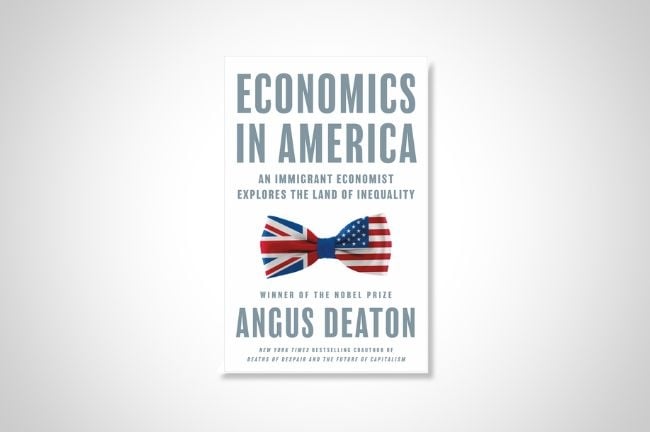You have /5 articles left.
Sign up for a free account or log in.

Princeton University Press
Economics in America: An Immigrant Economist Explores the Land of Inequality by Angus Deaton
Published in October 2023
Professor Deaton (Angus, if I can be so bold to be on a first-name basis with a Nobel Prize winner), sharing this (imagined) meal together is a pleasure.
Now that we are on the second bottle of this excellent wine, perhaps I might ask you to share your thoughts about the relationships between higher education and economic inequality.
In Economics in America, you take your fellow economists to task for the discipline’s failure to address the causes and consequences of wealth concentration and income stratification. In the book, you point out that modern economists have emphasized efficiency, productivity and economic growth over other goals, such as fairness, equity and compassion.
While your book has many ideas about how economists might contribute more positively to policy debates and how academic economists’ culture should evolve (fewer testosterone-fueled conference sessions), Economics in America has less to say about the place of universities in the conversation about inequality.
To ask plainly (if a bit provocatively), do you believe that the wealthiest universities are complicit in the trend toward societal wealth concentration?
Does the caste system of higher education, in which endowments are heavily skewed among a relatively few elite research institutions with global brands, do more than mirror societal inequality?
Is it possible that elite universities contribute to economic inequality by crowding out public investments and private philanthropy directed at access-oriented institutions, such as regional public universities and community colleges?
Has our system of academic haves (elite, globally branded private colleges and flagship R-1 public universities) and have-nots (most public universities and colleges, minority-serving institutions, and tuition-dependent institutions) served to normalize the concentration of societal privilege?
Why be so critical of economics departments concerning economic inequality without addressing the university contexts that academic economists exist within? After all, aren’t economists only behaving rationally in focusing their research activities in the areas that align with the outcomes that universities seek, such as external funding and prestige?
Of course, I’d be remiss in not pointing out that the American portion of your academic career is a product of our elite higher education system. The intellectual freedom and time to research and write afforded by our research-intensive elite postsecondary system allowed you to produce influential scholarship such as Economics in America and (along with Anne Case) Deaths of Despair and the Future of Capitalism.
As you are likely to point out, our higher education system is not a zero-sum game. A long-term societal commitment to supporting the best of our nonprofit institutions does not detract from the public and private resources that can (and should) be directed at the colleges and universities that educate the vast proportion of all students.
If elite universities are doing their jobs, then the graduates and ideas they produce should work together toward building a more enlightened public policy in which all colleges (particularly regional universities and community colleges) receive generous public support.
Economics in America makes a strong argument that what matters most in shaping policy is the marketplace of ideas. And while it is difficult to defend the concentration of wealth in a handful of universities, it is also difficult to dispute that those schools have an outsize influence in shaping our thinking.
Blaming wealthy universities for contributing to a system of ever-expanding economic inequality and concentrated privilege might be satisfying, but it likely is beside the point. The country (and the world) would undoubtedly be a poorer place (both intellectually and materially) if our best universities were to wither.
We should also acknowledge that while elite universities educate a relatively small number of learners, these schools provide phenomenal opportunities for those middle- and low-income students (through debt-free attendance) who are fortunate enough to gain admittance.
As an immigrant economist born in Scotland and educated at the University of Cambridge, you (Angus Deaton, my pretend dinner companion) have the advantage of firsthand knowledge of other systems of higher education. How can we maintain the strengths of the U.S. postsecondary system while not mirroring the inequalities that characterize our society?
What might an economist concerned with inequality have to say about our profoundly unequal higher education system?




